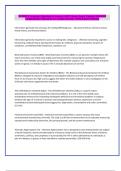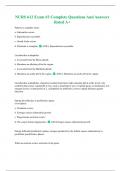NCMHCE test prep | Questions & Answers (100 %Score) Latest Updated 2024/2025
Comprehensive Questions A+ Graded Answers | With Expert Solutions
Information generally not necessary for making DSM diagnosis- - Educational history, family structure,
family history, and financial details
Information generally important to assess in making Axis 1 Diagnosis- - affective functioning, cognitive
functioning, medical history, developmental history (in children), physical complaints, duration of
symptoms, suicidal/homicidal tendencies, substance use
Beck Depression Inventory (BDI) - Beck Depression Inventory (BDI) is a 21-question multiple choice self-
report inventory, one of the most widely used instruments for measuring the severity of depression.
Since the client exhibits some signs of depression (for example saying no one cares about me, everyone
wants me gone), it is helpful to assess if he is clinically depressed. (5-10 min)
The Behavioral Assessment System for Children (BASC) - The Behavioral Assessment System for Children
(BASC) is designed to measure maladaptive and adaptive behaviors and self-perceptions of children
from 2.5 to 25 years old. High scores suggest that either the child's behavior is very maladaptive or the
child was rated more negatively than warranted
The Child Behavior Checklist (CBCL) - The Child Behavior Checklist (CBCL) is a parent-report
questionnaire on child behavioral and emotional problems. It is one of the most widely-used
standardized measures for evaluating maladaptive behavioral and emotional problems in subjects
between the ages of 2 and 18. It assesses internalizing behaviors (anxious, depressive, and over
controlled) and externalizing behaviors (aggressive, hyperactive, noncompliant and under controlled).
(15 min)
Family Environment Scale (FES) - Family Environment Scale (FES) is used to measure the social
environmental characteristics of family. The scale is a 90-item inventory that has 10 subscales measuring
interpersonal relationship dimension, the personal growth, and the system maintenance
Thematic Apperception Test - Thematic Apperception Test is designed to elicit interpretations by subject
of social situations. Stories and descriptions of pictures reveal some of the dominant drives, emotions,
sentiments, conflicts, and complexes of a personality.The TAT is often administered to individuals as
part of a battery, or group, of tests intended to evaluate personality. (100-200 min).
, Benton Test - The Benton Visual Retention Test is a neuropsychological test that is individually
administered test for ages 8-adult that measures visual perception and visual memory. It can also be
used to help identify possible learning disabilities.
DISC Assessment - The DISC is a personality assessment tool often used in vocational preference in
which a quadrant behavioral model is used to examine the behavior of individuals in their environment.
The assessment classifies four aspects of behavior by testing a person's preferences in word
associations. DISC stands for -Dominance, Influence, Steadiness, and Compliance. (15-20 min)
Million Clinical Multiaxial Inventory (MCMI) - The Million Clinical Multiaxial Inventory (MCMI) is a
psychological assessment tool intended to provide information on psychopathology, including specific
DSM disorders. It is intended for adults with at least an 8th grade reading level. The MCMI was
developed and standardized specifically on clinical populations (i.e. patients in psychiatric hospitals or
people with existing mental health problems), and the authors are very specific that it should not be
used with the general population or adolescents. (25-30 min).
California Psychological Inventory (CPI) - The California Psychological Inventory is a personality test
designed to evaluate interpersonal behavior and social interaction within normal individuals. The CPI
was created to assess the everyday "folk-concepts" that ordinary people use to describe the behavior of
the people around them. (45- 60 min).
Myers-Briggs Type Indicator - The Myers-Briggs Type Indicator (MBTI) is a personality test designed to
classify individuals according to the Jungian theory. The 16 types are typically referred to by an
abbreviation of four letters—For instance: ESTJ: extraversion (E), sensing (S), thinking (T), judgment (J)
and INFP: introversion (I), intuition (N), feeling (F), perception (P) (15-25 min).
ADE Needs Assessment - The ADE Needs Assessment is a comprehensive adult assessment tool often
used with substance and alcohol abuse. This instrument addresses life stress, attitude and emotional
stability, criminal history, and alcohol and/or drug use. (130 ?'s)
Woodcock-Johnson III - The Woodcock-Johnson III is a test of achievement which consists of two co-
normed batteries: Tests of Achievements and Tests of Cognitive Abilities. The two batteries assess
general intellectual ability, specific cognitive abilities, oral language and academic achievement. It can
be used with individuals from 2 years of age to 80+. (1 hour).
Conner's Rating Scales - Conner's Rating Scales is an assessment designed to assess ADHD and related
problems in children. (20 min).





